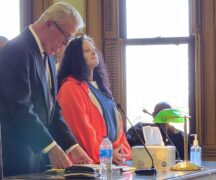By DAVID DUPONT
BG Independent News
The race for Common Pleas Court judge comes down to a contrast in experience.
Two candidates are vying to fill the vacancy caused by Judge Robert Pollex retirement—Matt Reger, a Republican from Bowling Green, and Stephen Long, a Democrat from Perrysburg.
Long, 52, points the variety of cases practice from divorces to appeals of criminal convictions, he’s handled as an attorney in private.
Reger, 49, points to his 20 years as a prosecutor and, before that, three years he spent working with Common Pleas Judge Charles Kurfess.
As a law clerk then staff attorney for Kurfess, Reger said, “I learned about how

Matt Reger (photo provided)
the court works, and I learned a lot about the temperament of the judge.”
He moved to the city prosecutor’s office 20 years ago, and became the municipal prosecutor 16 years ago. During that period he took a year off to spend in the former Soviet Republic of Georgia, helping that nation reconstruct its judicial system after years of Soviet rule.
“As a prosecutor it’s really given me an opportunity to do what I think is good for the community,” he said. Much of what he does, Reger said, is “social work.” Success as a prosecutor “is when you don’t see the person again, at least as a defendant.”
That sense of law as community service extends to the Community Christian Legal Services, which he founded.

Stephen Long
Reger said he views being a judge as “as a natural progression in public service.”
Long said he has the experience needed to become a judge. He cited county statistics showing 43 percent of the cases handled by Common Pleas Court involve domestic relations while another 32 are civil litigation. The rest involve felonies with sentences ranging from six months in prison to life.
His “breadth of experience” extends back to before he was a lawyer. He was a teacher before he started attending law school at the University of Toledo, at the same time, he noted, as Reger.
He found preparing a case was the same as preparing a lesson plan, except instead of students he was facing jurors.
For 22 years, he’s been running his own law office. Much of that caseload are divorces, he said. “There’s not a whole lot in domestic relations I haven’t seen.”
And as with many attorneys especially starting out worked as a court appointed attorney, which gave him an insight into handling felonies. “I’ve done hundreds of those,” Long said.
“I’ve found a niche taking appointments for appeals,” he said. And his “batting average” in those appeals is 25 percent. That shouldn’t be, he said, because these were cases that already lost in the lower court.
“I have a good sense of where the bombs are,” he said. “It gives me a sense of where judges make mistakes at criminal level.”
Long said “the intellectual portion” of being on a judge, “working the problem is what attracted me.”
But also from his years in practice “I’ve seen how it affects people when they have a matter in front of court. Win, lose or draw, it’s a stressful time, and I think that sensitivity will help me as a judge.”
Long said is cognizant of the importance of moving things along, “but you want to get them right.”
Long said sometimes it would help if judges made an effort to let the parties know, just where matters stood with the court, by bringing them together at each stage so they know what has gone on.
Judges not only have to be fair, he said, “they have to be perceived to be fair. Not only should they be listening, but they need to be perceived to be listening to both sides.”
Reger said temperament is a key quality for a judge. The judge should have “a temperament that has the ability to deal with all kinds of people and stay evenly keeled.”
Closely related to that is patience, he said. A judge has to be able “to listen to people and have the patience to not draw conclusions right away.”
Humility is another essential quality, he said. “The judge is there to make sure everyone has an equal footing, and that the process is fair. After practicing 23 years and being a prosecutor for 20 years, I have that kind of demeanor.”
The duty of the prosecutor, Reger said, is “to seek justice.”
It’s not just about getting convictions but “it’s to make sure the justice system works, that people’s rights are protected, that the community is protected from criminals and that people are not wrongly charged.”
Reger sees this role of “protecting the integrity of the court” as leading naturally into being a judge.




